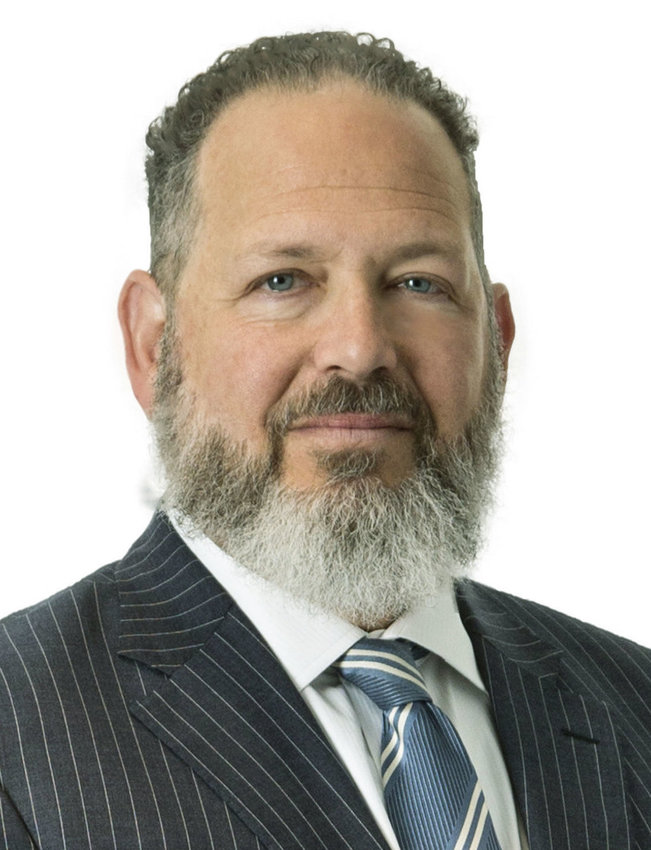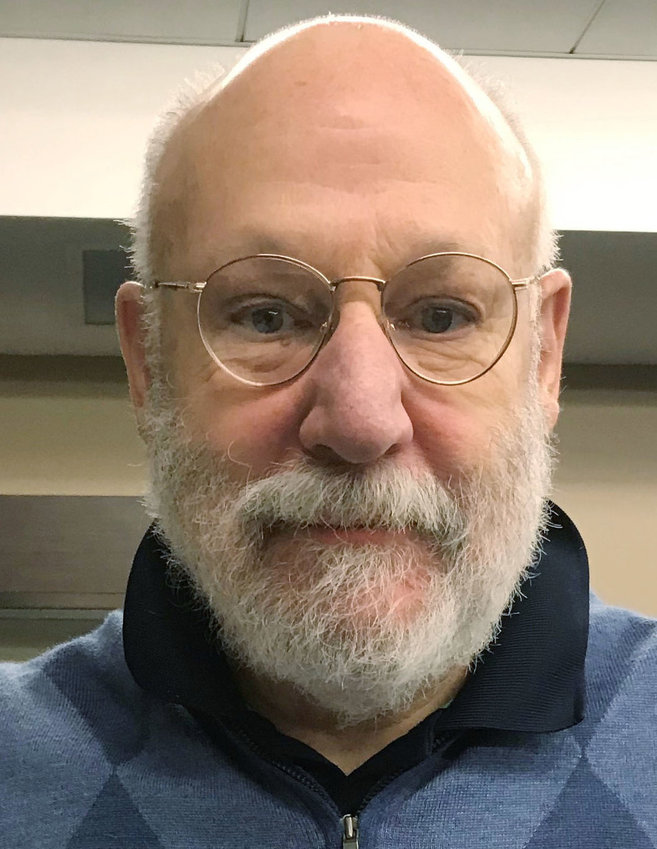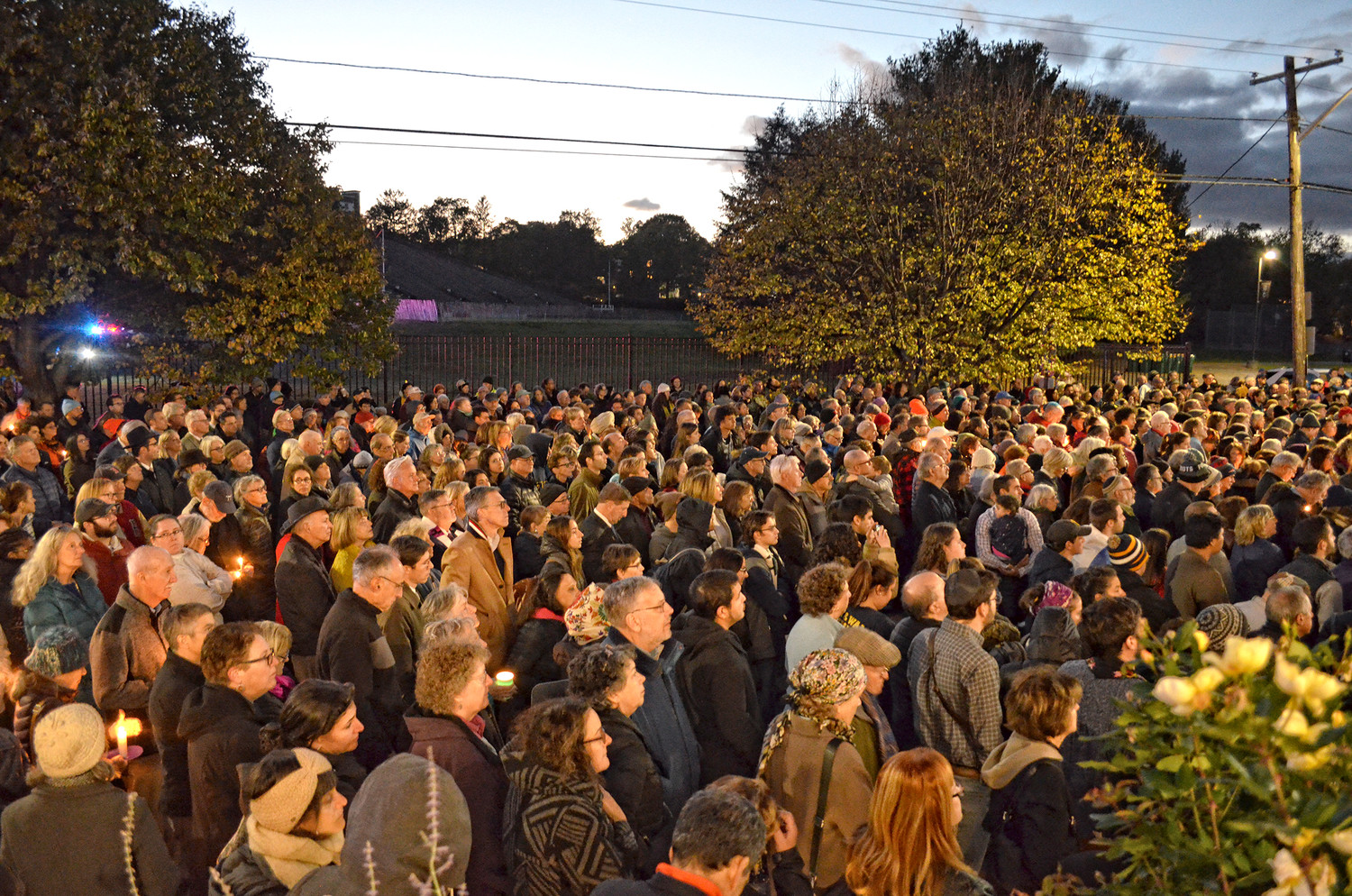To carry or not: Guns in the synagogue
After Pittsburgh and more mass shootings, how do we protect ourselves?
A NEW FEATURE LOOKING AT DIFFICULT CHALLENGES.
Newspapers have always been a place where community gathers – a town square of sorts. They are a place where people learn what is happening, hear the opinions of their neighbors, celebrate joys and recount tragedies.
Newspapers provide not only a community record, but they present opportunities for reasoned dialogue. The format lends itself to respectful, civil dialogue. When readers must sign their name to their opinion, they must use facts to build their arguments, and a space is created where people can actually hear each other: since we cannot read two things at the same time, people cannot talk past each other in a newspaper.
It is in this spirit that you will start to see some new features in Jewish Rhode Island. Beginning with this issue, we are introducing “The Conversation.”
Our goal is to re-establish a place in our society for civilized discussion and debate. To create a space where we can disagree without being disagreeable.
– ADAM GREENMAN, president and CEO of the Jewish Alliance of Greater Rhode Island and publisher of Jewish Rhode Island.

The Jews’ only defense
In light of the increase in anti-Semitic incidents throughout the country and the reality of recent mass shootings, it is very timely to consider the propriety of “guns in the synagogue.” Unlike in Europe, where the presence of armed synagogue security has been in place for decades, such a concept is strange to American Jews.
I generally am not shy about expressing opinions. Nevertheless, in light of the contentious nature of this debate, and the strongly felt views on both sides, I fear that expressing my opinion on this issue now is likely to be more divisive than helpful. Let me explain.
I respectfully suggest that engaging in this type of debate feeds into the objectives of those who seek to do us harm. It factionalizes our community and weakens what should be our focus on combating anti-Semitism. Nor will it resolve the differences of opinion in the gun debate.
Needless to say, we must act responsibly to protect our community from all manner of threats. This is true in all places of public gathering in a civil society. This physical threat, however, is already being addressed responsibly, with appropriate security measures developed for each particular location by the stakeholders. We in Rhode Island are fortunate to have both the Jewish Alliance and the Touro Fraternal Association underwriting a major portion of the cost of security at every shul in the state.
The threat of gun violence is real, but a lone gunman does not present an existential threat to the Jewish people. What does present an existential threat is our failure to focus on what we must do to preserve and strengthen our Jewish community.
The Jewish people have survived and prospered for well over 3,000 years. We were subjugated by the greatest powers throughout history. The Babylonians, Assyrians, Seleucids, Romans, Byzantines, Nazis, Soviets and others have sought our communal and physical destruction. Yet, we survived.
We have been expelled from more countries, and have been subject to more repressive laws, than any other people. Our enemies sought to defeat us through assimilation and by force. Yet somehow, despite the odds, we survived – refusing to give up our faith and holding on to that which makes us different.
Yes, we are different. We eat different foods, we observe Shabbat on Friday/Saturday, we study our holy texts and we aspire to live a life of good deeds in keeping with our traditions.
Throughout history, those committed Jews who did not succumb to forced assimilation moved on to carry on our traditions in new locations in the Diaspora. Despite the difficulties, we always persevered and flourished.
So how did the Jews survive after such treatment over the millennia? Some will surely say that it was God’s will. Others focus on the strength and commitment of our ancestors, who stood firm against every adversity.
The stories of great Jews like Rabbi Akiva, who was martyred instead of forsaking God, or the Maccabees, who fought to protect the Temple, are seared into our collective memories.
There is no question that we are again under attack. But will arming ourselves solve the problem? I don’t know. I do know that we must adhere to the lessons of our history and not succumb to the influences that seek to turn Jew against Jew.
Adherence to our communal practices, our commitment to God and Torah, our focus on both Jewish and secular education, and on family, and the fact that we are different in many positive ways will help us flourish through these challenging times.
As fall and the High Holy Days approach, it is the perfect time to reflect upon ourselves, upon our connection to the Jewish people, and upon the miracle of our continued survival. It is my belief that it is our responsibility to embrace our Judaism, and reject the destructive forces that seek to divide us as a people.
Instead, we should focus on what each of us can do to strengthen our Jewish community. There are many opportunities. We can increase participation in our shuls, give tzedakah, study a Jewish text, support Jewish education, teach our children the beauty of celebrating Shabbat.
As we are sitting in shul this holiday season contemplating our relationship with God, we can rest easy knowing that our security needs are being provided for by the generosity of Jewish benefactors.
Instead of detailing my thoughts on one of the most sensitive issues in our contemporary political discourse, I share my prayer that we come together as a people in peace and fellowship, that we each recommit to taking actions that bring us together as a community, that we turn our focus to educating our next generation, and that we go from strength to strength.
JEFFREY GLADSTONE is a partner at Partridge Snow & Hahn, in Providence, and has been an active advocate for Jewish causes locally and nationally.

Let’s not create more risks
So, you are worried that the synagogue might be a target, and you think that if there were guns being carried in the synagogue, you would be safe – or at least safer. Think again.
You have a greater chance of dying in a car crash than you do in an airplane crash, but you dread flying. Well, that is similar to facing a mass shooter in your synagogue. There are roughly 40,000 gun deaths a year in this country. About 24,000 are suicides. The remaining roughly 16,000 are classified as homicides, with a small number considered accidents or deaths at the hands of law enforcement.
Maybe about 350 or so of these are considered “mass” shootings, depending on the definition – typically, three or four or more deaths, not counting the shooter. Even one is too many, but a small percentage of these are school, church, synagogue and public-place shootings.
There is no question that Jews and Jewish houses of worship have increasingly been targets of anti-Semitism, graffiti, vandalism and even armed attacks. In response, there has been an increased use of various security measures, such as cameras inside and outside, alarms, door buzzers and private security or law-enforcement details, especially at times when many people are expected to be in these buildings. There is also increased contact with law enforcement, whose job it is to track terrorism and threats in the area.
These measures and others are all preferable to having civilians with guns in the building.
To buy a handgun in Rhode Island, one must be at least 21 years of age, make necessary application, go through a background check, and take and pass a handgun instruction and safety course. There are several ways to take the course, and it can be completed in a couple of hours on a Saturday afternoon. There is also a seven-day mandatory waiting period, and the seller must provide a trigger lock with the purchase.
Provisions for buying a rifle or “long gun” are less strenuous, and you must be at least 18.
Open carry is not permitted. In order to carry a handgun on your person, one must have a concealed-carry permit issued by either a local police chief or the attorney general’s office. No special training is required. Roughly one-half of 1% of Rhode Islanders have concealed-carry permits, or about 5,000 people.
Police officers in Rhode Island go through weeks of training to learn how to safely handle a firearm, how to use it, when or when not to use it, and how to de-escalate situations involving a weapon. They are also trained in how to deal with an active-shooter situation. They must requalify every year. And still they make mistakes.
Providence police carry semiautomatic pistols in a holster specially designed to prevent the gun from being removed by someone other than the officer. That does happen, but it is rare.
Civilians with concealed-carry permits do not have any specific training in how to deal with an active shooter. They can carry any type of handgun, whether appropriate for the task or not. They may have any kind of holster, or just stick the gun in their waistband, as long as it is not observable and is covered by a jacket, shirt or clerical robe.
The risks of armed civilians far outweigh any hypothetical benefit. The chance of a mass shooting is small, and it is unlikely that an armed congregant would be in the right place at the right time to do much, even if he or she had the requisite training.
And who should be authorized to carry in the synagogue? Members, anyone off the street, the custodial staff, the administrative staff, clergy? Would the synagogue be obligated to set standards for training? If someone not selected by the synagogue has a concealed-carry permit, can they come to synagogue armed? What insurance would be required to cover the synagogue if someone discharged a weapon intentionally or unintentionally?
In a synagogue, a person with a concealed-carry permit is more likely to leave their gun in the restroom, have it fall out of its holster, shoot themselves in the groin while adjusting their pants, or have it taken away by someone who shouldn’t have it than to ever use it against a mass shooter. A civilian with a gun is also more likely to perceive a threat from an unruly teenager or an unknown visitor, and draw his or her gun, than to be confronted by an active shooter.
Anyone holding a gun when law-enforcement arrives also runs the risk of being shot and killed. Law enforcement must treat anyone with a gun as a threat.
National Rifle Association boss Wayne LaPierre has said, “The way to stop a bad guy with a gun is a good guy with a gun.” I say, “A good guy with a gun is one trigger pull away from being a bad guy with a gun.”
DAVID H. LEACH lives in Providence and advocates for social and community justice causes in Rhode Island and elsewhere.








